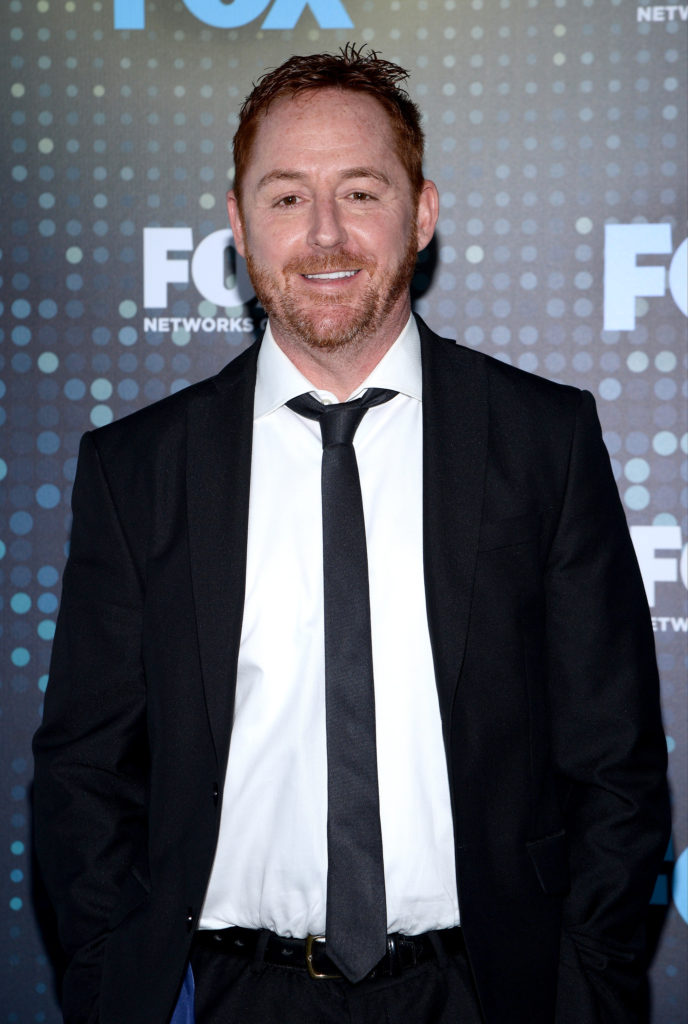
*Feature originally ran 11/08/17
Beepers. Enron. Blockbuster Video.
Scott Grimes’ career has outlasted them all. In an industry where an actor’s longevity seems not too far removed from the on-field expectancy of NFL defensive linemen, that is an impressive feat. Even more extraordinary is that the roles Grimes tackles in front of the camera continue to inhabit worlds that exist within multilayered, high profile projects.
As a boy he starred in the horror classic “Critters.” As a young man he appeared in “Crimson Tide.” As he matured, so too did the characters he portrayed on-screen, from Donald G. Malarkey in the HBO classic “Band of Brothers” to Archie Morris in the long-running medical drama “ER.” For the last 13 years the Massachusetts native has voiced Steve Smith in “American Dad!” and most recently he joined the crew of an interplanetary exploratory space vessel, serving as ace pilot Lt. Gordon Malloy in the new science fiction series “The Orville.”
We recently sat down with Grimes to discuss finding the comedy in “The Orville,” why it’s show-up-television, and how a chance conversation with a friend led to 13 years of animated greatness.
TrunkSpace: When young Scott Grimes was dreaming of a career as an actor, did any of it involve spaceships, aliens, and sci-fi storytelling?
Grimes: Everything you just said. I always loved medieval and stuff like Middle-earth. I was a big Hobbit fan, of the books, and “Lord of the Rings” and all that. I was also a big sci-fi fan. There’s so many levels to this on a childhood dream level, which is pretending to be in space. Now we’re also just throwing a little comedy in on top of that. And then, working with someone for so many years… I was never the kind of person that wanted to, or thought I would, just jump from director to director. I always knew that I’d continue to work for the same people because you don’t really wake up in the morning and say, “I want a redhead in this role!” So, when you get someone that wants to work with you, like me, you usually want to stick with it, because they like you.
All those things, and to get to work with Seth MacFarlane on a daily basis, is just a gift. So yes, it was a childhood dream of mine to pretend to be in space.
TrunkSpace: You mentioned the comedy dropped in on top of things with “The Orville.” Does having it be a sort of genre hybrid allow you to do things from a performance standpoint that you can’t in something that is strictly drama or strictly comedy?
Grimes: Actually, you know, it’s more difficult than I imagined. I did “ER” for seven years. My job on “ER” was to be the kind of comic relief of a drama show and I found that a little easier within the realm of the medical genre, because the comedy could come from fucking up, from being not a good doctor, and just the banter when things aren’t in an emergency. But now, with “The Orville,” Seth and I spoke, and Jon Favreau and I when we did the pilot, on end about where this comedy is gonna come in, in the midst of a dire battle situation. When we film it, I always give a couple versions, because the comedian in me, and the comedian in Seth, want to give the funniest version of the line that was written. But you can’t do that. You can’t do that. Then it becomes the movie “Airplane.” Then you’re saying a joke in the middle of something crashing.
I think we figured out a way for it to work, and it’s right on that line. And that’s been the most difficult thing for me on “The Orville,” throwing in my job, which is to be a little bit of the comic relief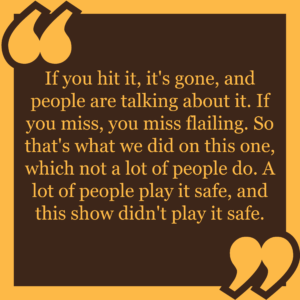 during something that people are taking pretty seriously. You don’t want someone at home to go, “Dude, why did you have to say that stupid thing when we’re in the middle of this great explosion?”
during something that people are taking pretty seriously. You don’t want someone at home to go, “Dude, why did you have to say that stupid thing when we’re in the middle of this great explosion?”
TrunkSpace: You don’t want to pull the viewer out of the moment?
Grimes: No. That was a big thing for us, so I choose to say these funny things within the moment of – maybe say it because you’re scared. Maybe it’s coming from an uncomfortable place in you that you can’t handle. So that’s been the biggest challenge of this for me.
TrunkSpace: So was a big part of the process for everyone as a whole on “The Orville” just finding the right tone with the show?
Grimes: Of course. Seth knows what the show was. And when I watch it, I see it now, but you can’t crawl into somebody’s mind. You can try to explain it. He’s a bit of an introvert, so he can try to explain everything to everybody, but it’s our job to kind of figure it out. But, yeah, that was the whole thing. Favreau, I remember in the pilot, he sat us down and said, “We’re either gonna knock this one out of the park, or we’re gonna fail miserably.” And I actually think that is such a great equation for success – for great success in any athlete or anybody trying an invention or anything like that, because you’re swinging for the backseats. If you hit it, it’s gone, and people are talking about it. If you miss, you miss flailing. So that’s what we did on this one, which not a lot of people do. A lot of people play it safe, and this show didn’t play it safe.
TrunkSpace: It’s hard to be inventive and recreate the wheel playing it safe.
Grimes: Exactly. And I think just because we’re not getting “Seinfeld” numbers, what we are getting is, people love the show. And they love it because they’ve never seen it before.
TrunkSpace: With that being said, nobody is getting “Seinfeld” numbers anymore, but with “The Orville,” you’re getting today’s equivalent, right?
Grimes: I think so. Especially for a new show. But you know, for many years people loved procedurals, because what procedurals were, and I’m not knocking any procedural – they’re all great and I’ve done a bunch of them – but they’re kind of cheap little movies. Well, what Seth did is, he realized that he has to do these mini movies, because people don’t really want, or I don’t anyway, to watch a soap opera. I don’t want to watch something that I have to see every episode in order to understand the last one. And with this, we’re doing kind of hour long movies every week.
And I think people are getting that, and they’re enjoying it. It’s very popcorn. They can just sit down with the popcorn, and go, “Let’s watch Orville, man!” And that’s what I’m hearing a lot of is, people just really love the experience. They’re like, “Okay, I’ve got my this, I’ve got my that, it starts in four minutes. God, am I ready? Cool, I can’t wait!” And they sit down for that show-up-television kind of feel, like when you knew something was coming on, you know?
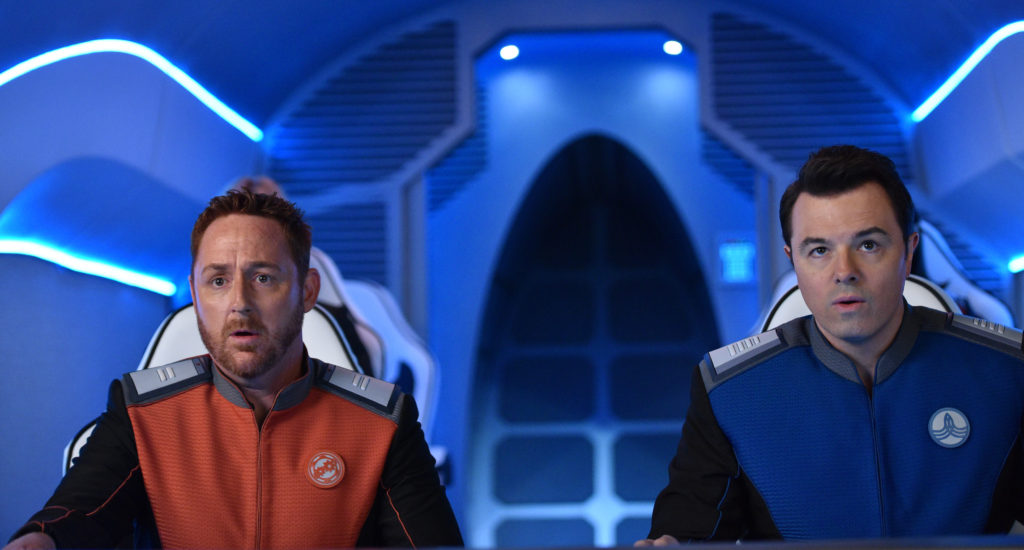
TrunkSpace: Absolutely. It becomes event TV. And when you don’t have that connective tissue holding every single episode together, you can watch it without having to amass every episode on your DVR.
Grimes: Yeah, and if you get like I’ve gotten… like with “Stranger Things”… I’m kind of starting “Stranger Things” right now because what happened was, I got so behind that I was like, “Fuck it. I can’t. It’s too much work for me right now to start. I’m gonna start another show.” I had to go back and watch the first three that I watched, because I don’t remember what happened. You don’t have to do that with “The Orville.” I love “Stranger Things,” don’t get me wrong – I think it’s an amazing show – but, “The Orville” is a little easier.
TrunkSpace: It seems like science fiction is a bit like a brand more so than a genre. People who love science fiction tend to tune in regardless of if it is based on something existing or not. Did you find that was the case with “The Orville?” Did it already have a built-in audience when you guys kicked off?
Grimes: Well, I’m gonna, in a weird sort of way, argue a little of that, because our built-in audience was “Star Trek.” Again, there’s never been a show like “The Orville” that is kind of a modern look at the future. Instead of, the kind of dark look, which I love. I love “Blade Runner” and all of those shows that show this dark kind of, “we messed up as people” kind of look. This is more, “we figured it out and we’re in a positive, Seth MacFarlane’s version” of a positive future.
But, I think that the audience that we had of “Star Trek” fans were also sitting back in their chairs with their arms crossed going, “Why are you messing with what I love? Why are you taking something I love and not just redoing it. This is exactly how I love it.” So, we actually had to start from beneath, to win these people with this new idea. I think we had to really, really show these people that we cared and that we were doing an homage to “Star Trek” and adding to it.
TrunkSpace: It’s the Trojan horse of science fiction shows.
Grimes: (Laughter) Absolutely. That’s exactly right.
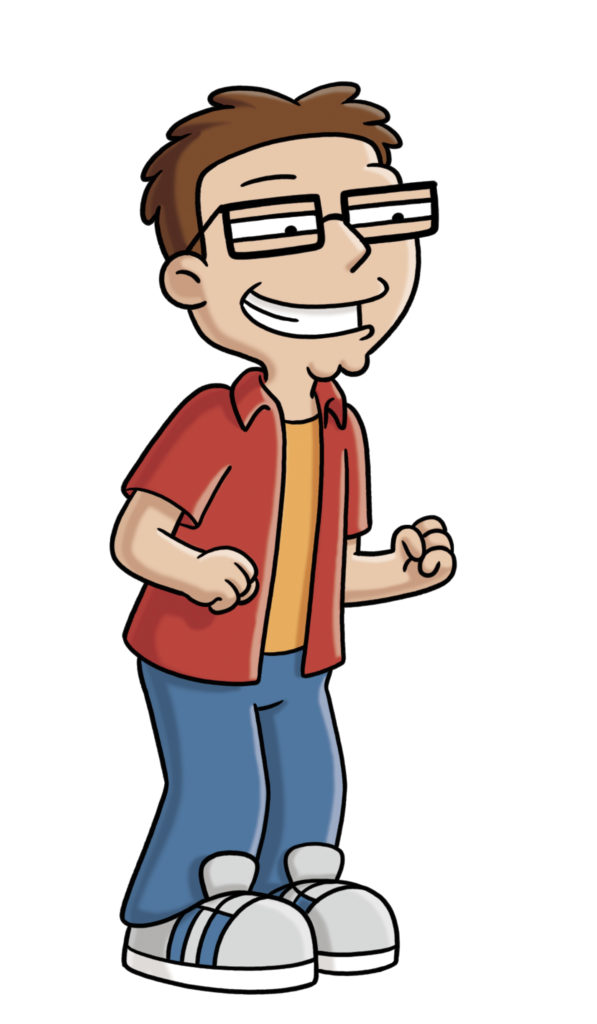
TrunkSpace: So when it comes to the character, what did Lt. Gordon Malloy offer you in terms of performance that you have yet to be able to tackle in your career?
Grimes: I’m a little bit more intelligent, I hope, than Gordon, but it’s been a great opportunity for me to be comfortable in playing closer to myself. How many times have I pretended to drive a spaceship? (Laughter) I’m very good at pretending to drive a spaceship in real life. On “ER,” pretending to be a doctor is a little bit more difficult. That wasn’t what Scott Grimes would do. So this guy was really close to me.
And also, being comfortable working with, as an actor, a man, all you really need, all you want, is to be comfortable with failing. I remember doing the movie “Robin Hood” and I was so nervous working with Ridley Scott that I was so nervous to mess up. There’s helicopters everywhere and horses, and if you messed up, it cost a lot of money. So I didn’t do my best work, because I wasn’t as comfortable as I could have been. On “The Orville,” this character, it’s the first time I’ve been just crazy comfortable on a set to be stupid, to fail, because when you’re comfortable with doing that, you’re also comfortable with getting it right, and when you hit it, you hit it big.
TrunkSpace: Is a part of that also being so comfortable with the creative team already?
Grimes: God, yes. The producers and the writers… this is the first time I’ve felt a part of a production, instead of just feeling a part of the acting. And not that I’m writing anything, but David A. Goodman, one of our writers, will come up to me and say, “Hey, should we say this line instead of this line?” And I’ll go, “Oh, God, that’s funny. Let’s show Seth.” Not that I wrote it, but he’s coming to me and asking me my opinion, and that’s never happened to me, so you just feel like you’re a part of something a bit bigger, when you actually watch it and it’s doing well.
TrunkSpace: You’ve done over 230 episodes of “American Dad!” now. Is there any better job in the industry than a prime time animated series?
Grimes: It’s unbelievable. It’s a gift. Again, to bring up “ER,” I had a lunch break on “ER” and I walked up to a friend of mine named Mark, and I said, “You know, Seth wants me to go over and audition for this thing called ‘American Dad!,’” and this friend of mine, Mark, he said, “You should go.” I’m like, “Well, I don’t really know how to do voices well…” And my friend talked me into it. I owe that friend some money, because it’s been 13 years now of a steady, beautiful paycheck and great friends, and great work. And I owe it all to that decision that I made, because it is an absolute gift.
TrunkSpace: When people stop you on the streets or reach out to you via social media, what’s the one project that they most want to ask you about?
Grimes: “The Orville” would be the one now, because for some reason people love to shout that one out, but it would be “Band of Brothers,” just because of how long it’s been, and how much it keeps growing. When I walk down the street, I feel like “Band of Brothers” just started two days ago.
“The Orville” airs Thursdays on FOX.


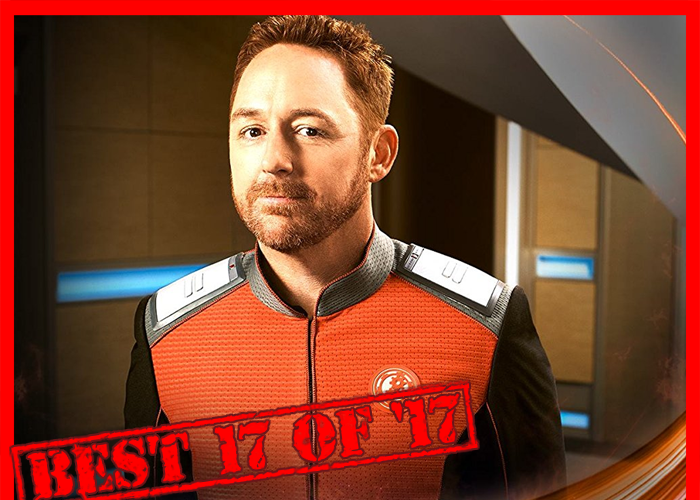
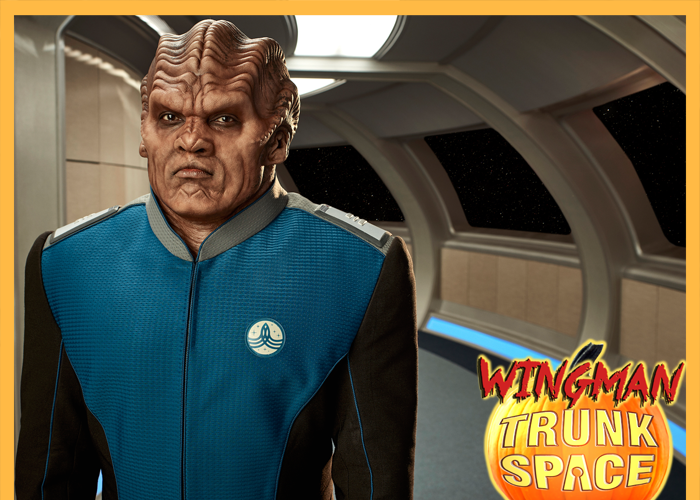
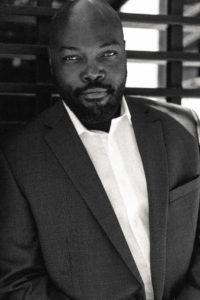
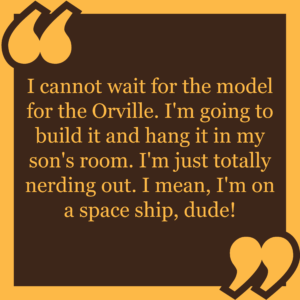 about 30 percent of my hearing, I have kind of limited range, like periphery and turning my neck, and stuff like that. But then you just use that for the character, because he’s kind of stiff and he’s kind of a rigid, no nonsense, very serious cat. So, you know, it just kind of works itself in. You just take what you get, and you make it into what you’re supposed to make it.
about 30 percent of my hearing, I have kind of limited range, like periphery and turning my neck, and stuff like that. But then you just use that for the character, because he’s kind of stiff and he’s kind of a rigid, no nonsense, very serious cat. So, you know, it just kind of works itself in. You just take what you get, and you make it into what you’re supposed to make it.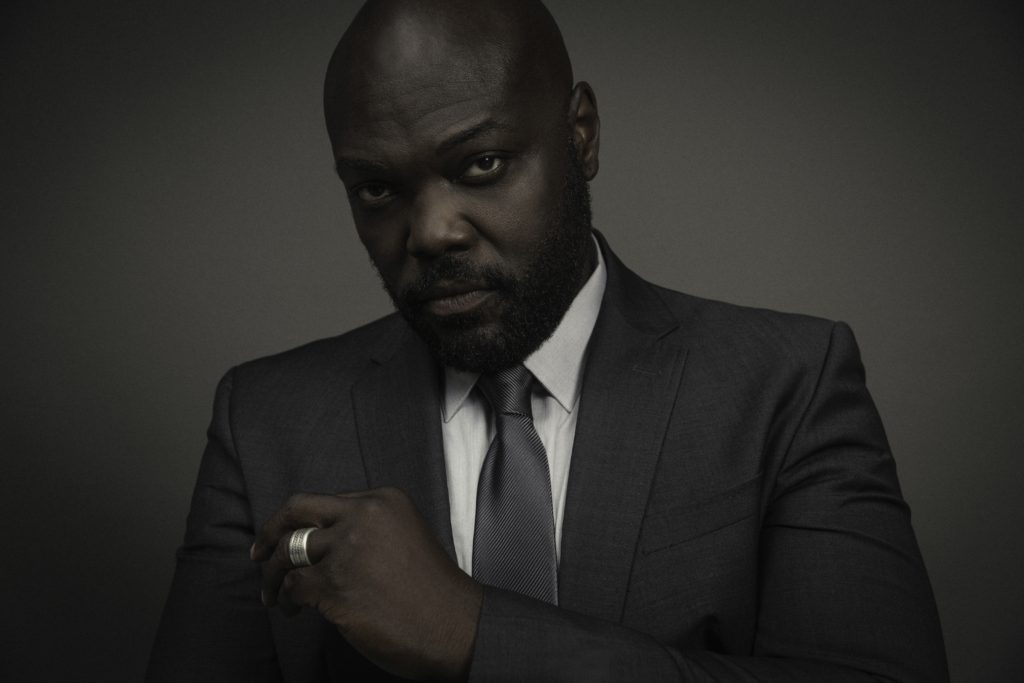
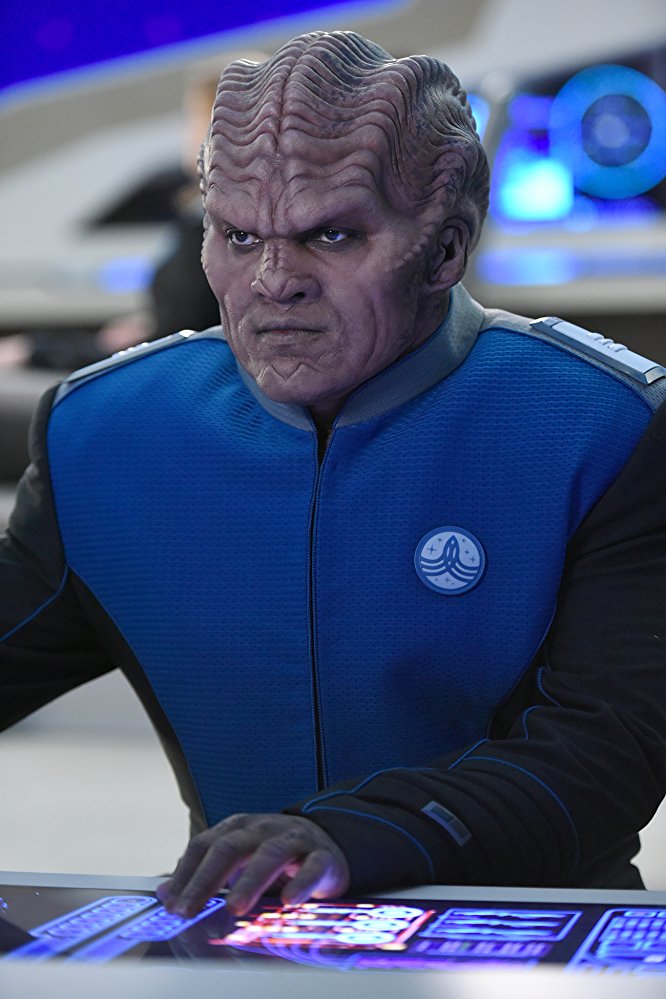 TrunkSpace: And on the opposite side of that coin, 10-year-old you must be psyched because you’re on a spaceship getting to bring this really fun, alien character to life?
TrunkSpace: And on the opposite side of that coin, 10-year-old you must be psyched because you’re on a spaceship getting to bring this really fun, alien character to life?